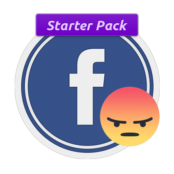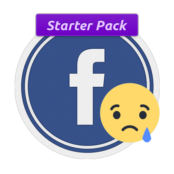Despite being all about helping people across the world connect and interact with each other, social media can be a very lonely place, especially if you have a question about why your Facebook likes sometimes decrease after adding paid likes to your account.
All official answers will harp on how buying likes is discouraged—but it still is very commonplace—without really telling you whether there is a real connection between your decision to buy likes and the fall in likes in your Facebook account. Or whether it is a glitch in the Matrix! Or just one of those weird coincidences.
So, let’s try to find out why exactly your Facebook likes may decrease after you bought likes for your account.
One reason could be your decision to buy likes from a firm or service provider making obvious use of bots, spam accounts, and other stuff that does not fit into Facebook’s user policies. Receiving a hundred likes from generic accounts with very little real information that have been setup from a single IP address will fall foul of Facebook’s anti-spam filters.
So, if you plan on buying likes, then make sure you choose a service provider who does not make it too obvious or too easy for the social media website.
The Quirks of Technology
Another reason could be the undeniable fact that anti-spam efforts of Internet monoliths like Google, Facebook, Instagram etc. rely a lot on automated processes. And these automated processes don’t work well all the time.
Technology is a wonderful thing but that doesn’t mean it is completely infallible, especially when deployed without human supervision.
Automated filters are programs coded to look for and recognise specific type of activities on the site and react accordingly. Sometimes, even a page like or a post like from an unlikely source may be misinterpreted as spam.
Combined with your recently-bought Facebook likes, the filer may simply see it as further spam activity and delete it all. The worst part is that there is no scope for any kind of explanations. The sheer volume of traffic means this is completely automated.
Even if you do manage to get somebody to respond to your query and accept your proofs about how the FB likes deletions were unfair, you are unlikely to get anything beyond a muted apology and a ‘these things just happen’ response.

Perils of Automation
Another reason for reduction in likes could be connected to the perils of automation. Now, a piece of code that works perfectly under the control and supervision of a human may behave very oddly when setup in an automated environment.
Take self-driving cars for example. There have been instances of the code hitting the emergency brakes during test runs for something as harmless as leaves flying across the road. This is not to say that such technologies won’t work.
In case of Facebook itself, there have been instances of classic nude sculpture or nudes painted by master artists being flagged down for violating FB’s obscenity and nudity policies.
It’s just that you just don’t know how your account activity fits within the code programmed into the anti-spam filters. This is a grey area that, perhaps, is just the price we pay for enjoying real-time social interaction with billions of people across the globe.
Algo Updates
In an ideal world, social media would not be dominated by big companies with deep pockets and, in turn, people would not try to game social media to gain a competitive advantage. Yet, we don’t live in this ideal world, which means social media sites are constantly updating their algorithms to prevent user policy violations.
Now, there have been numerous instances of good quality sites relying solely on white hat SEO strategies being penalised by Google after a major algo update. Sites lose their search engine rankings, receive warning mails, and even face risk of losing out on earned ad revenue merely because the update algo has chinks in its code.
Stuff that was always acceptable may suddenly seem spam-like for algorithms merely because they are yet to wrap their brains around the latest algo update rollout. Happens more often than you think and the best that Google and others offer is that a good quality website will, eventually, recover.
So, while your decision to buy likes may have brought your account under the scanner, chances are that your losing likes is more a result of algo changes and other technical stuff than any actual wrongdoing on your part.
Coincidence
It’s interesting to note that most people don’t really focus on loss of likes until they buy FB likes. It could well be a psychological thing where you are worried about whether you have done the right thing by buying likes for your Facebook account and end up noticing even the smallest reduction in metrics.
One simple way to resolve this would be to maintain a record of your likes and other metrics well before you deploy the paid likes to your account. This may help you realise that likes often come down and go back again as a routine.
Such a record will serve as definitive proof that it isn’t something that your mind is overreacting to and that your account is indeed bleeding likes, especially after you just added paid ones.
Conclusion
Facebook would like you to believe that buying likes is the sole reason for loss of likes. Had that been the case, then nobody would have ever deployed paid likes successfully, right?
Fall in likes after adding the bought likes to your FB account is probably the virtual equivalent of normal wastage that occur in a manufacturing process. The smartest way ahead would be to provide for such losses when planning your paid-likes strategy.
Of course, this certainly doesn’t mean having to write off a significant portion of the new FB likes as unavoidable losses. Working with a professional agency relying on genuine accounts without suspicious and spammy histories will help reduce chances of such losses.
















